The post Recap: DBpedia Training @ Data Week Leipzig appeared first on DBpedia Association.
]]>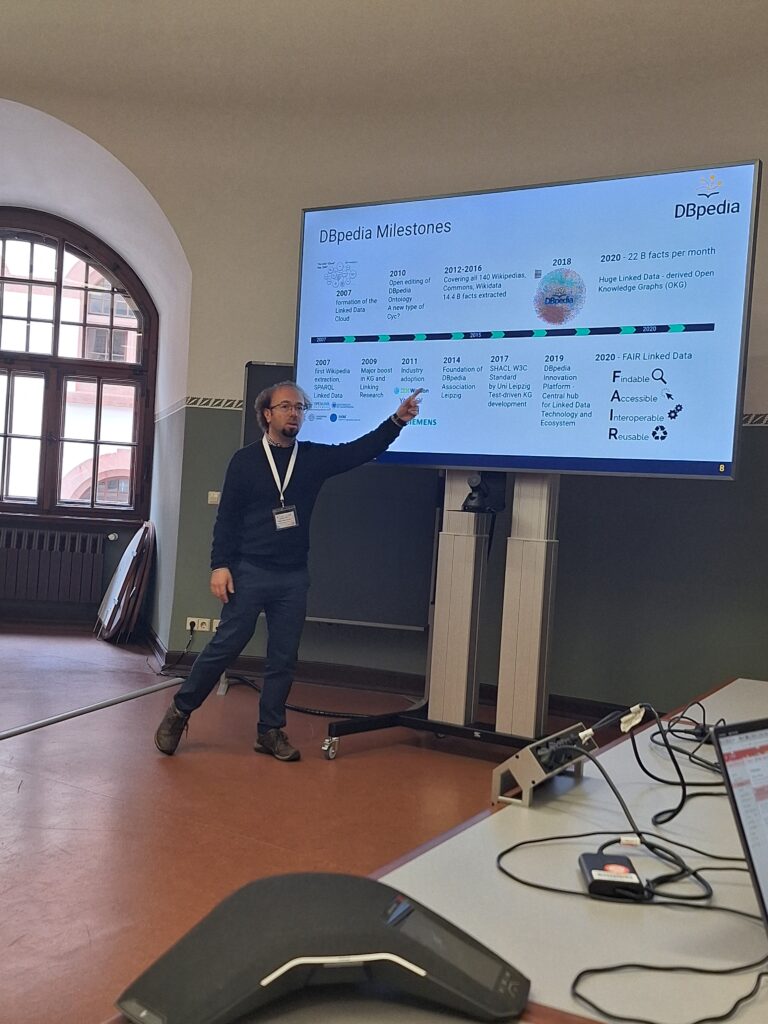
On 16 April, as part of Data Week Leipzig, the DBpedia training on the topic of “Harnessing the Power of DBpedia: Transforming Data into Knowledge” took place with three sessions and different presentations in each. This workshop was designed to introduce you to the vast capabilities of DBpedia and its suite of technologies that are reshaping the way we interact with the world’s knowledge. This tutorial gave all participants an insight into the comprehensive DBpedia technology ecosystem. It was also an opportunity to learn how to integrate and leverage these components to create innovative solutions.
Opening of the DBpedia Training
Milan Dojchinovski (InfAI, DBpedia Association, CTU Prague) and Sebastian Hellmann (InfAI, DBpedia Association) started the opening of the DBpedia Training with general information on the tutorial. Topics of this training were DBpedia in the nutshell, the DBpedia Databus, Databus Use Cases and Deploying your own DBpedia. We also presented four showcases: Semantic Indexing and Search using DBpedia tech, CI and Databus publishing using Jenkins, Databus Metadata Overlay Search System and Terminology Server using Databus, Lookup and Archivo.
Session 1: DBpedia Tech Overview and DBpedia Databus
In the first session, Milan Dojchinovski gave an overview of DBpedia and Sebastian Hellmann gave an introduction to Databus Use Cases, followed by the presentations on “Databus and Collections” and “Making your own DBpedia KG” by Jan Forberg.
Session 2: DBpedia and Databus Showcases: Semantic Indexing and CI
The second session started with “Semantic Indexing and Search using DBpedia Spotlight and Databus” by Jan Forberg which was followed by Kirill Yankov with “CI and Databus publishing using Jenkins”.
Session 3: DBpedia and Databus Showcases (cont.): Metadata Overlay Search and Terminology Server
In the last session, Jan Forberg and Jonathan Justavino Lüderitz talked about “Databus Metadata Overlay Search System (MOSS)”. The final presentation was given by Johannes Frey on “Terminology Server using Databus, Lookup and Archivo”.
Closing Session
Finally, in the closing session, chaired by Milan Dojchinovski (InfAI, DBpedia Association, CTU Prague) there was time for a little wrap-up, questions and feedback on the DBpedia Training.
The slides from the DBpedia Training are available here.
We are looking forward to more DBpedia events in the next months. Stay safe and check Twitter or LinkedIn. Furthermore, you can subscribe to our Newsletter for the latest news and information around DBpedia.
Maria & Julia
on behalf of the DBpedia Association
The post Recap: DBpedia Training @ Data Week Leipzig appeared first on DBpedia Association.
]]>The post DBpedia – GSoC Bonding Period 2024 appeared first on DBpedia Association.
]]>Contributor Projects Announced
This week Google finally announced who is selected as a GSoC contributor for this year. Accepted contributors are therefore now paired with mentors and start planning their projects and milestones.
GSoC Community Bonding
As the Community Bonding is starting now from May, 1 until May, 26 it is now the time to spend a month learning more about DBpedia and it’s community before coding starts on May, 27. Check the timeline on our page! To get in touch with your mentores and everyone else from the DBpedia Community, you have plenty of options:
- First of all, you can chat with other DBpedians on Slack, where you are able to join DBpedia developers discussion and technical discussions.
- To increase your visibility in the DBpedia Community, try to answer some questions in the DBpedia forum (especially in the unanswered & support category) and browse the topics.
- Last but not least, check out our Github repository for open issues and see if you can help to solve them (e.g issues regarding the extraction framework or mappings).
When you share something about your project on your own blog or github, please inform us and your mentors. Thus, we can share it with the community and show your working progress as well as your results.
In case you still have questions, please do not hesitate to contact us via dbpedia@infai.org.
Check Twitter or LinkedIn and feel free to subscribe to our newsletter for the latest news and information around DBpedia.
We wish you all the best!
Julia
on behalf of the DBpedia Association
The post DBpedia – GSoC Bonding Period 2024 appeared first on DBpedia Association.
]]>The post GSoC 2024 – Call for Contributors appeared first on DBpedia Association.
]]>We have been accepted to be part of this incredible program to support young ambitious developers who want to work with open-source organizations like DBpedia. So far, each year has brought us new project ideas, many amazing students and great project results that shaped the future of DBpedia. Even though Covid-19 changed a lot in the world, it couldn’t shake Google Summer of Code (GSoC) much. The program, designed to mentor youngsters from afar is almost too perfect for us. One of the advantages of GSoC is, especially in times like these, the chance to work on projects remotely, but still obtain a first deep dive into Open Source projects like us.
DBpedia is now looking for contributors who want to work with us during the upcoming summer months.
What is Google Summer of Code?
Google Summer of Code is a global program focused on bringing developers into open source software development. Funds will be given to all new beginner contributors to open source over 18 years to work for two and a half months (or longer) on a specific task. For GSoC-Newbies, this short video and the information provided on their website will explain all there is to know about GSoC2024.
And this is how it works …
| Step 1 | Check out one of our projects here or draft your own. |
| Step 2 | Get in touch with our mentors as soon as possible and write up a project proposal of at least 8 pages. Information about our proposal structure and a template are available here. |
| Step 3 | After a selection phase, contributors are matched with a specific project and mentor(s) and start working on the project. |
Application Procedure GSoC2024
Further information on the application procedure is available in our DBpedia Guidelines. There you will find information on how to contact us and how to appropriately apply for GSoC2024. Please also note the official GSoC 2024 timeline for your proposal submission and make sure to submit on time. Unfortunately, extensions cannot be granted. Final submission deadline is April 2, 2024 at 18:00 UTC.
Contact
Detailed information on how to apply are available on the DBpedia website. We’ve prepared an information kit for you. Please find all necessary information regarding the student application procedure here.
And in case you still have questions, please do not hesitate to contact us via dbpedia@infai.org.
Stay safe and check Twitter or LinkedIn. Furthermore, you can subscribe to our Newsletter for the latest news and information around DBpedia.
Finally, we are looking forward to your contribution!
Yours DBpedia Association
The post GSoC 2024 – Call for Contributors appeared first on DBpedia Association.
]]>The post A year with DBpedia – Retrospective Part 2/2023 appeared first on DBpedia Association.
]]>Tutorial @ Language, Data and Knowledge conference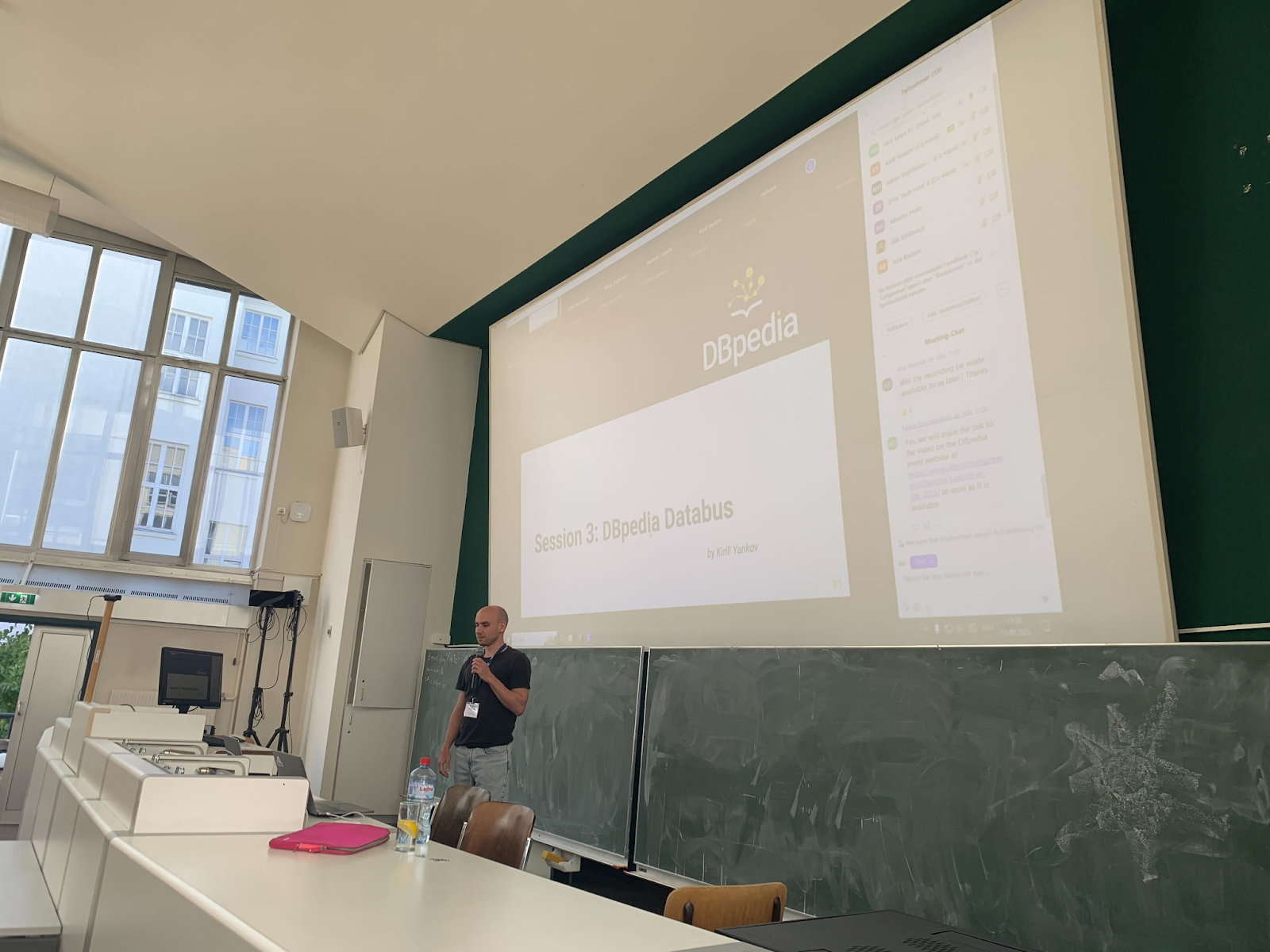
On 13th of September, 2023, an exciting tutorial took place at the University of Vienna in the Center for Translation Studies as part of the LDK 2023. The LDK conference focuses on the acquisition, maintenance and use of language data in the context of data science and knowledge-based applications. The tutorial was opened by Milan Dojchinovski (InfAI, DBpedia Association, CTU in Prague). This was followed by three sessions, which were accompanied by many real-world practical use cases, on the DBpedia Knowledge Graph, the infrastructure and the use of the databus data publishing platform. Check more details on our events page.
DBpedia Day @ SEMANTiCS in Leipzig
DBpedia Day was once again part of the program at this year’s SEMANTICS conference 2023. It was held on 20th of September at the HYPERION Hotel Leipzig with up to 100 DBpedians. Once again this year, our CEO Sebastian Hellmann opened the day with a presentation of the “DBpedia Databus version 2.1.0”. This was followed by the exciting keynote speech “Towards Foundation Models for Data Spaces” by Edward Curry from the University of Galway, Ireland. Afterwards, we organized the member session and the DBpedia Science Talk session. All slides can also be found on our events page.
Databus
Databus pre-launch announcement
We are in the final stage of the DBpedia Databus open software release (GitHub). Remaining issues include quality of life and UI improvements. Check out the Databus feature matrix for our lightweight, scalable, adaptable, powerful Data Catalog Platform (direct download link, persistent data identifier on the databus). Contact dbpedia@infai.org for demo, business, or research proposal inquiries.
Databus excels at cataloging de-central data of any filetype using RDF/DCAT. We selected a few initial focal use cases, where the Databus serves as:
- AIModelHub for AI training data, models, validation, and deployment.
- Research Data Management Catalog for research institutes and communities.
- Supply-Chain-Management Platform for product information collection along the supply chain and construction of Digital Product Passports.
- Community Data Portal, e.g., for the DBpedia Community.
DBpedia Contributions will be enabled soon, taking DBpedia to the moon! 🚀
In DBpedia’s future, the Databus will be used to collect community contributions more effectively, giving DBpedia an enormous boost in quantity and quality. https://databus.dbpedia.org already catalogs over 350k files with over 1 Million file downloads per month! We are preparing showcases, templates, and documentation for these community contribution types:
- Community Extensions such as caligraph.org or AI-improved abstracts.
- Community Link Contributions for inclusion in the main graph.
- RDF profiles for DBpedia Users and Members (FOAF, Schema.org, WebID) via Databus Accounts (including publication of expertise).
- Dockerized RDF Tool Deployment so you can automatically load DBpedia and other RDF data into your favorite RDF tools via Databus collections. Our Databus-powered Virtuoso SPARQL Endpoint Quickstart Docker has already been deployed over 150k times!
We do hope we will meet you and some new faces during our events next year. The association wants to get to know you because DBpedia is a community effort and would not continue to develop, improve and grow without you. We plan to have a tutorial at the LREC-COLING 2024 conference and a meeting at SEMANTiCS, Sep 17-19, 2024, conference in Amsterdam, Netherlands.
Stay safe and check Twitter, Instagram and LinkedIn or or subscribe to our Newsletter for the latest news and information.
Yours,
Julia & Maria
on behalf of the DBpedia Association
The post A year with DBpedia – Retrospective Part 2/2023 appeared first on DBpedia Association.
]]>The post Recap 2023: A Year with DBpedia appeared first on DBpedia Association.
]]>
Can you believe it..? … sixteen years ago the first DBpedia dataset was released. Sixteen years of development, improvements and growth. Now more than 4,100 GByte of data is hosted on the DBpedia Databus. We want to take this as an opportunity to send out a big “Thank you!” to all contributors, developers, members, hosters, funders, believers and DBpedia enthusiasts who made that possible. Thank you for your support!
In the upcoming blog series, we will take you on a retrospective tour through 2023. Furthermore, we will give you insights into a year with DBpedia. In the following we will also highlight our past events.
Snapshot Release
We are pleased to announce immediate availability of a new edition of the free and publicly accessible SPARQL Query Service Endpoint and Linked Data Pages, for interacting with the new Snapshot Dataset. In 2023, we released version 2022-12 release with all the features since version 2022-09. The current Snapshot Release contains more than 850 million facts (triples). Please check more details on our website.
Google Summer of Code (GSoC)
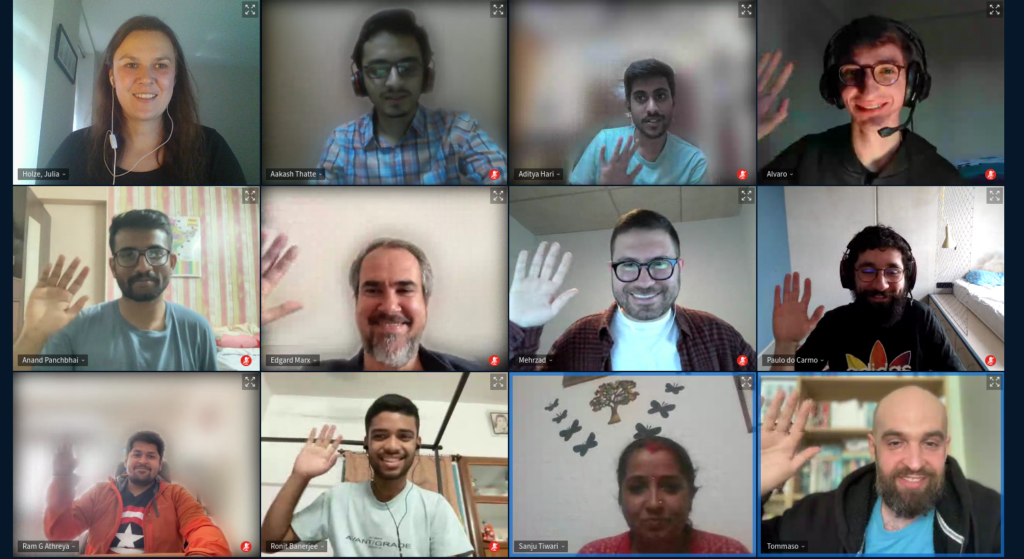
For the 12th year in a row, we have been able to support and guide young, ambitious developers who have joined us as an open source organization. We encouraged them to work on a programming project this summer. Each year we have been inspired by new project ideas, many amazing contributors, and mostly great project results that have shaped the future of DBpedia. If you want to have deeper insights in our GSoC contributors work you can find their blogs and repos on the DBpedia blog.
DBpedia @ Leipzig Semantic Web Day
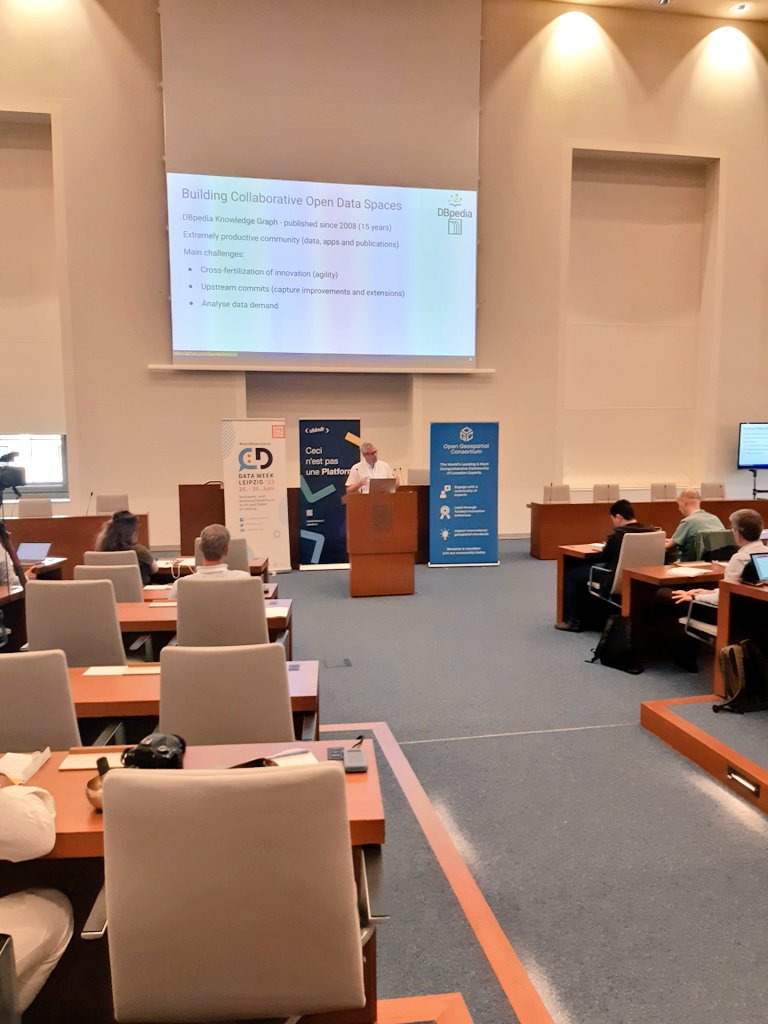
On June 28, 2023, Sebastian Hellmann presented the DBpedia Databus 2.1. at Data Week Leipzig. Data Week is the networking and exchange event for highlighting scientific, economic, and social perspectives of data and its use, where industry, citizens, science, and public authorities can enter into dialogue. Data Week Leipzig took place June 26-30, 2023. Please find Sebastian’s slides here.
In the upcoming blog post after the holidays we will give you more insights in the past events and technical achievements. We are now looking forward to the year 2024. The DBpedia team plans to have a tutorial at the LREC-COLING 2024 conference and the DBpedia Day at SEMANTiCS 2024 conference in Amsterdam, Netherlands.
Above all, we wish you a merry Christmas and a happy new year. In the meantime, stay tuned and check our Twitter, Instagram or LinkedIn channels. You can subscribe to our Newsletter for the latest news and information around DBpedia.
Julia & Maria,
on behalf of the DBpedia Association
The post Recap 2023: A Year with DBpedia appeared first on DBpedia Association.
]]>The post Retrospective: Google Summer of Code 2023 appeared first on DBpedia Association.
]]>
For the 12th year in a row, we have been able to support and guide young, ambitious developers who joined us as an open source organization to work on a programming project over this summer. This year we were once again inspired by new project ideas, great results and dedicated students. From the numerous and wonderful project applications we received, we were able to select six proposals to take part in the GSoC with their project idea. Every year, Google Summer of Code offers a great opportunity to work on projects remotely while getting a deep insight into open source projects like ours – DBpedia.
Meet our Google Summer of Code 2023 contributors and their projects
During our summer program, our six finalists worked intensely on their DBpedia projects and achieved great results to show to the public. Topics in the projects included machine learning and natural language processing, extraction frameworks and chatbot development. If you want to have deeper insights into our GSoC contributer’s work you can find their blogs and repos in the following list. Check them out!
- Towards a Neural Extraction Framework
- Multilingual Neural Data-to-Text Generation
- Knowledge Graph aware Recommendation System with DBpedia
- Question-Answering over DBpedia with Pretrained Auto-regressive Models
- DBpedia eXplainable Chatbot (DBpedia XChat)
- DBpedia Search API enhancement (SANTé)
Thanks to mentors
Thanks to all our mentors around the world for joining our project and supporting us with their expertise and kindness. Above all, a big thank you to those who have supported us for many years in a row. Thank you all again for spending over 3.5+ months working with this year’s GSoC contributors and helping them become better open source contributors!
Mentor Summit
After the last GSoC Mentor Summit took place online and was therefore open to all organisation admins and mentors, this year a mentor was again selected to attend the Mentor Summit 2023, which took place from Friday 13th to Sunday 15th October at the TETRA & Marriott Hotel Sunnyvale, California and was attended by @DiegoMoussallem.
After GSoC is before the next GSoC
We can not wait for the 2024 edition. Likewise, if you are an ambitious contributor who is interested in open source development and working with DBpedia you are more than welcome to either contribute your own project idea or apply for project ideas we offer starting in early 2024. If you would like to know where previous mentors and contributors are now working, please read our GSoC blog post about the last 10 years of DBpedia at GSoC.
In case you like to mentor a project do not hesitate to also get in touch with us via dbpedia@infai.org.
Stay safe and check Twitter or LinkedIn. Furthermore, you can subscribe to our Newsletter for the latest news and information around DBpedia.
Maria & Julia
on behalf of the DBpedia Association
The post Retrospective: Google Summer of Code 2023 appeared first on DBpedia Association.
]]>The post DBpedia – GSoC Bonding Period 2023 appeared first on DBpedia Association.
]]>Student Projects Announced
Today Google finally announced who is selected as a GSoC student for this year. Accepted students are therefore now paired with a mentor and start planning their projects and milestones.
GSoC Community Bonding
As the Community Bonding is starting now from May, 4 until May, 28 it is now the time to spend a month learning more about DBpedia and it’s community before coding starts on May, 29. To get in touch with your mentores and everyone else from the DBpedia Community, you have plenty of options:
- First of all, you can chat with other DBpedians on Slack, where you are able to join DBpedia developers discussion and technical discussions.
- To increase your visibility in the DBpedia Community, try to answer some questions in the DBpedia forum (especially in the unanswered & support category) and browse the topics.
- Last but not least, check out our Github repository for open issues and see if you can help to solve them (e.g issues regarding the extraction framework or mappings).
When you share something about your project on your own blog or github, please inform us and your mentors. Thus, we can share it with the community and show your working progress as well as your results.
In case you still have questions, please do not hesitate to contact us via dbpedia@infai.org.
Check Twitter or LinkedIn and feel free to subscribe to our newsletter for the latest news and information around DBpedia.
We wish you all the best!
Emma
on behalf of the DBpedia Association
The post DBpedia – GSoC Bonding Period 2023 appeared first on DBpedia Association.
]]>The post Retrospective 2022 – Half a year with DBpedia appeared first on DBpedia Association.
]]>DBpedia Tutorial @ The Web Conference 2022
On April 25th DBpedia organized an Online Tutorial at this year’s The Web Conference. The main topic of this tutorial was the DBpedia community project which is centered around the DBpedia Knowledge Graph, the DBpedia Infrastructure and the DBpedia Services. The tutorial also contained a session dedicated on the DBpedia’s current motto, i.e. Global and Unified Access to Linked Data. In practical examples we illustrated the potential and the benefit of using DBpedia in the context of the Web of Data. Get more information and a deeper insight on the blogpost.
DBpedia is part of the Google Summer of Code project 2022
So far, each year has brought us new project ideas, many amazing students and great project results that shaped the future of DBpedia. Like every year, again we received many applications this year. Out of these applications 5 great projects from students all over the world were selected to work together with our mentors. Right now the students are in the middle of the coding phase.
DBpedia Tech Tutorial @ Knowledge Graph Conference 2022
On Wednesday the 2nd of May, 2022 DBpedia organized a tutorial 2.0 at the Knowledge Graph Conference (KGC) 2022. The ultimate goal of the tutorial was to teach the participants all relevant tech around DBpedia, the knowledge graph, the infrastructure and possible use cases. Moreover, this year’s tutorial builded up on previous year tutorials. The tutorial aimed at existing and potential new users of DBpedia, developers that wish to learn how to replicate DBpedia infrastructure, service providers, data providers as well as data scientists. Get more information and a deeper insight on the blogpost.
What Will the Future Bring?
We are now looking forward to the first Data Week Leipzig with the first DBpedia Knowledge Engineering PhD symposium, which will be held on July 6, 2022. If you want to know more about the different presentations and co. have a look at the website here https://dataweek.de/ and get yourself a ticket!
In addition we will organize DBpedia Day on September 13, 2022 at the Semantics Conference in Vienna. Check more details on our event page and save your seat now!
Stay safe and check Twitter or LinkedIn. Furthermore, you can subscribe to our Newsletter for the latest news and information around DBpedia.
Julia & Emma
on behalf of the DBpedia Association
The post Retrospective 2022 – Half a year with DBpedia appeared first on DBpedia Association.
]]>The post GSoC2022 – Call for Contributors appeared first on DBpedia Association.
]]>Brain: Wear a mask, keep our distance, and do the same thing we do every year, Pinky. Taking over GSoC2022.
For the 11th year in a row, we have been accepted to be part of this incredible program to support young ambitious developers who want to work with open-source organizations like DBpedia.
So far, each year has brought us new project ideas, many amazing students and great project results that shaped the future of DBpedia. Even though Covid-19 changed a lot in the world, it couldn’t shake Google Summer of Code (GSoC) much. The program, designed to mentor youngsters from afar is almost too perfect for us. One of the advantages of GSoC is, especially in times like these, the chance to work on projects remotely, but still obtain a first deep dive into Open Source projects like us.
DBpedia is now looking for contributors who want to work with us during the upcoming summer months.
What is Google Summer of Code?
Google Summer of Code is a global program focused on bringing developers into open source software development. Funds will be given to all new beginner contributors to open source over 18 years to work for two and a half months (or longer) on a specific task. For GSoC-Newbies, this short video and the information provided on their website will explain all there is to know about GSoC2022.
And this is how it works …
| Step 1 | Check out one of our projects here or draft your own. |
| Step 2 | Get in touch with our mentors as soon as possible and write up a project proposal of at least 8 pages. Information about our proposal structure and a template are available here. |
| Step 3 | After a selection phase, contributors are matched with a specific project and mentor(s) and start working on the project. |
Application Procedure
Further information on the application procedure is available in our DBpedia Guidelines. There you will find information on how to contact us and how to appropriately apply for GSoC2022. Please also note the official GSoC 2022 timeline for your proposal submission and make sure to submit on time. Unfortunately, extensions cannot be granted. Final submission deadline is April 19, 2022 at 18:00 UTC.
Contact
Detailed information on how to apply are available on the DBpedia website. We’ve prepared an information kit for you. Please find all necessary information regarding the student application procedure here.
And in case you still have questions, please do not hesitate to contact us via dbpedia@infai.org.
Stay safe and check Twitter or LinkedIn. Furthermore, you can subscribe to our Newsletter for the latest news and information around DBpedia.
Finally, we are looking forward to your contribution!
Yours DBpedia Association
The post GSoC2022 – Call for Contributors appeared first on DBpedia Association.
]]>The post 2021 – Oh What a Fantastic Year appeared first on DBpedia Association.
]]>In the upcoming blog series, we like to take you on a retrospective tour through 2021, giving you insights into a year with DBpedia. In the following we will also highlight our past events.
A year with DBpedia – Retrospective Part 1
Our New Face

On January 28, 2021, the new DBpedia website went online. We worked on the completion for about a year and at the beginning of 2021 we proudly presented the new site to the community and our members. We used the New Year’s break 2022/2021 as an opportunity to alter the layout, design and content of the website, according to the requirements of the community and our members. We’ve created a new site to better present the DBpedia movement in its many facets. We additionally integrated the DBpedia blog on the website, a long overdue step. So now, you have access to all in one spot. Read our announcement here.
Giving knowledge back to Wikipedia: Towards a Systematic Approach to Sync Factual Data across Wikipedia, Wikidata and External Data Sources
Since the beginning of DBpedia, there was always a strong consensus in the community, that one of the goals of DBpedia was to feed semantic knowledge back into Wikipedia again to improve its structure and data quality. It was a topic of many discussions over the years about how to achieve this goal. We received a Wikimedia Grant for our project GlobalFactSyncRE and re-iterated the issue again. After almost two years of working on the topic, we would like to announce our final report. We submitted a summary of this report to the Qurator conference and presented it there on February 11, 2021:
Towards a Systematic Approach to Sync Factual Data across Wikipedia, Wikidata and External Data Sources. Sebastian Hellmann, Johannes Frey, Marvin Hofer, Milan Dojchinovski, Krzysztof Wecel and Włodzimierz Lewoniewski.
Read the submitted paper here.
DBpedia Tutorial at the Knowledge Graph Conference
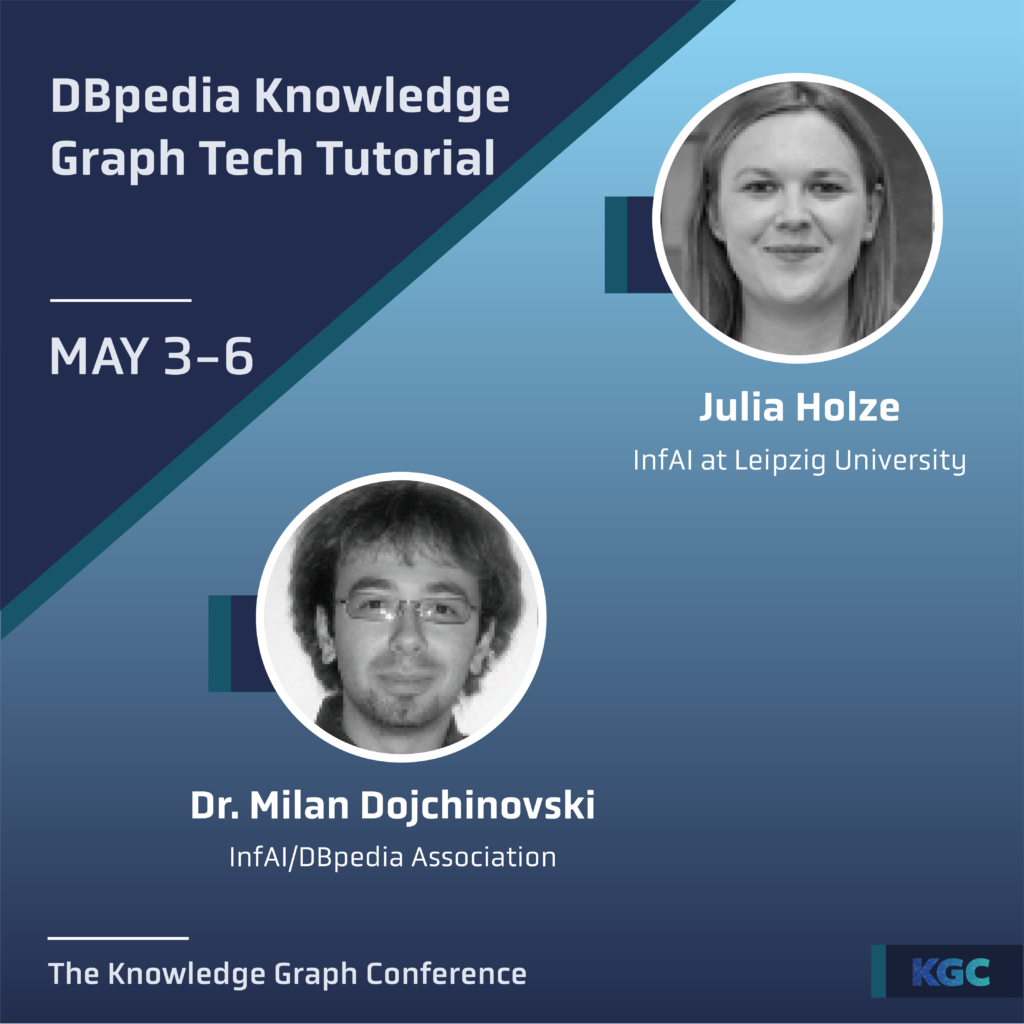
On May 4, 2021, we organized a tutorial at the Knowledge Graph Conference 2021. The tutorial targeted existing and potential new users and developers that wish to learn how to replicate our infrastructure. During the course of the tutorial the participants gained knowledge about the DBpedia Knowledge Graph (KG) lifecycle, how to find information, access, query and work with the DBpedia KG and the Databus platform as well as services (Spotlight, Archivo, etc). If you missed our presentations, please check our slides here.
Most Influential Scholars
DBpedia has become a high-impact, high-visibility project because of our foundation in excellent Knowledge Engineering as the pivot point between scientific methods, innovation and industrial-grade output. The drivers behind DBpedia are 4 out of the TOP 10 Most Influential Scholars in Knowledge Engineering and the C-level executives of our members. Check all details here https://www.aminer.cn/ai2000/ke.
Google Summer of Code and DBpedia
For the 10th year in a row, we were part of this incredible journey of young ambitious developers who joined us as an open source organization to work on a GSoC coding project all summer. Even though Covid-19 changed a lot in the world, it couldn’t shake GSoC. If you want to have deeper insights in our GSoC student’s work you can find their blogs and repos on the DBpedia blog.
DBpedia Global: Data Beyond Wikipedia
Since 2007, we’ve been extracting, mapping and linking content from Wikipedia into what is generally known as the DBpedia Snapshot that provided the kernel for what is known today as the LOD Cloud Knowledge Graph. On June 7, 2021, we launched DBpedia Global. It’s a more powerful kernel for LOD Cloud Knowledge Graph that ultimately strengthens the utility of Linked Data principles by adding more decentralization i.e., broadening the scope of Linked Data associated with DBpedia. Think of this as “DBpedia beyond Wikipedia” courtesy of additional reference data from various sources. Get more insight and read the announcement on the DBpedia blog.

In the upcoming blog post after the holidays we will give you more insights in the past events and technical achievements. We are now looking forward to the year 2022. We plan to have meetings at the Data Week 2022 in Leipzig, Germany and the SEMANTiCS 2022 conference in Vienna, Austria. Furthermore, we will be part of the WWW’22 conference and organize a tutorial.
We wish you a merry Christmas and a happy new year. In the meantime, stay tuned and check our Twitter, Instagram or LinkedIn channels. You can subscribe to our Newsletter for the latest news and information around DBpedia.
Julia,
on behalf of the DBpedia Association
The post 2021 – Oh What a Fantastic Year appeared first on DBpedia Association.
]]>